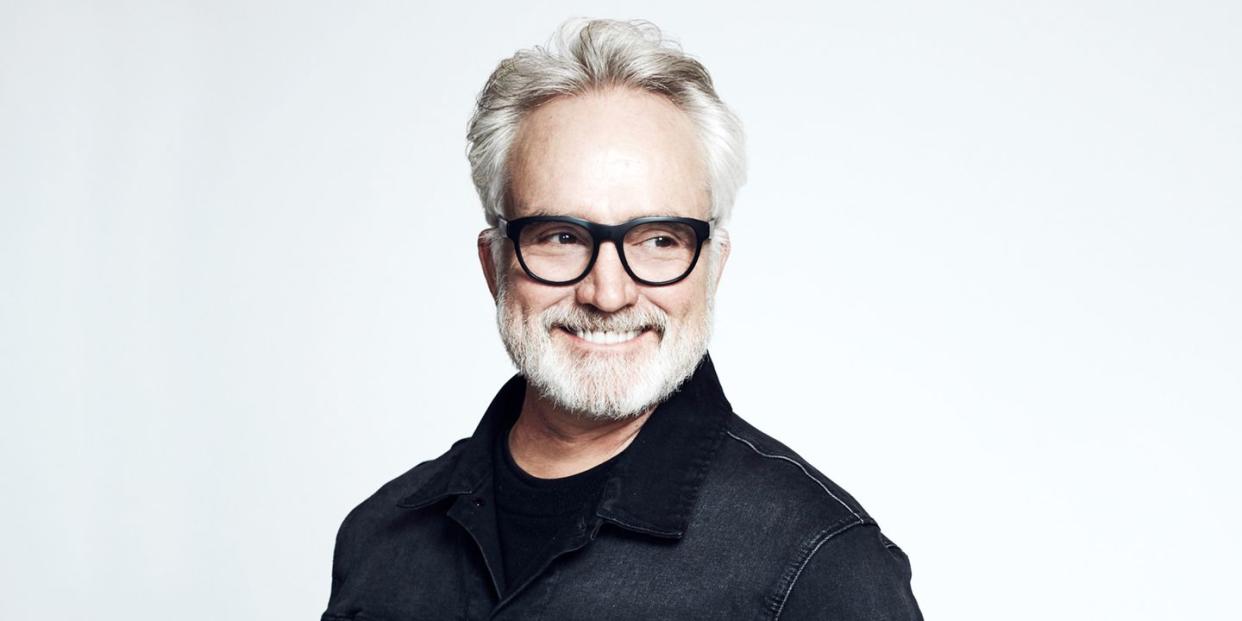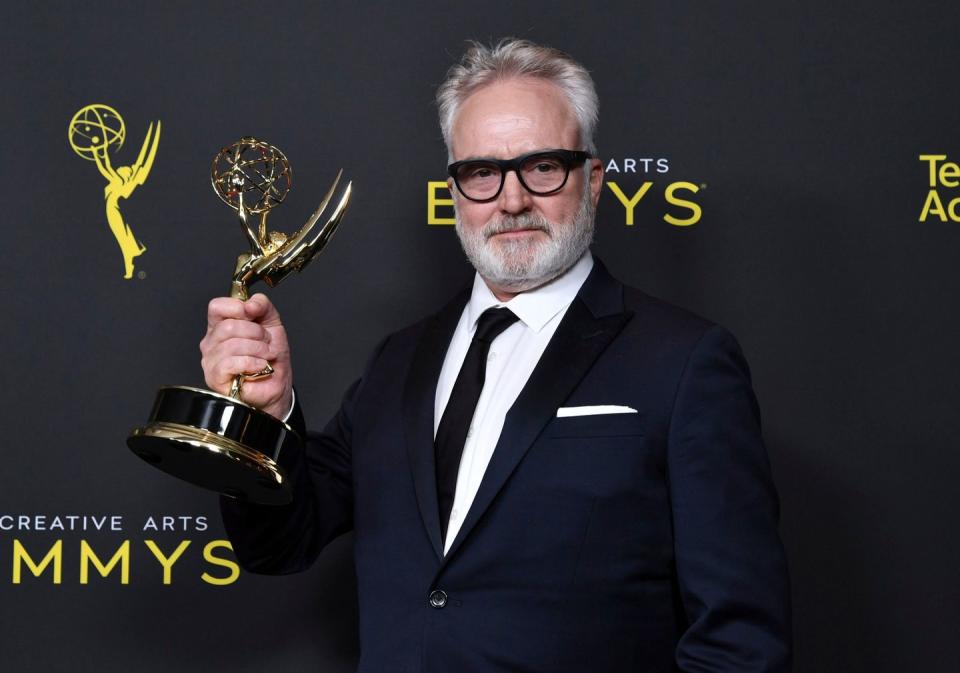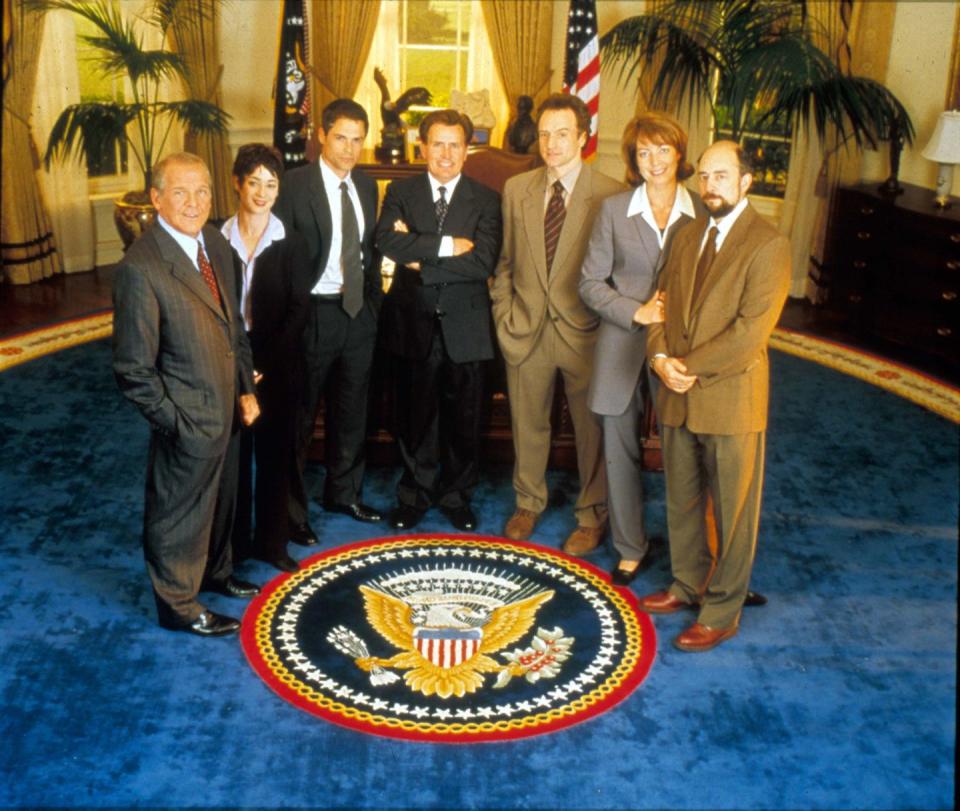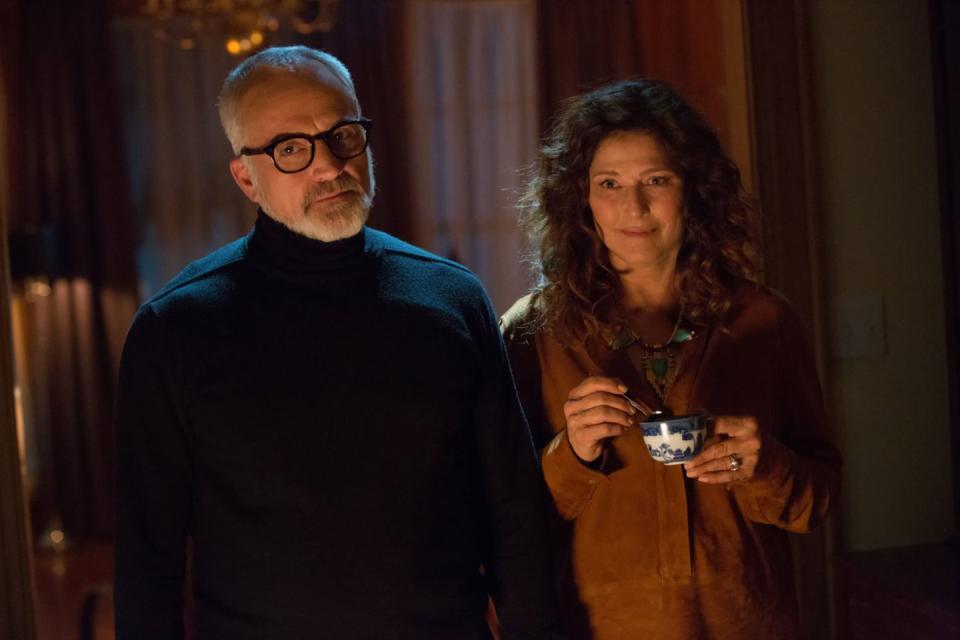Bradley Whitford: I’m Tracking the Death of Democracy Through My Acting Choices

Bradley Whitford is holding up a teacup with a sly smile. This is not just any teacup—it’s the teacup, the one that became instantly iconic after Catherine Keener used it to hypnotize an unsuspecting Daniel Kaluuya in Jordan Peele’s revolutionary 2017 satire Get Out. The teacup, and by extension Keener and Whitford’s characters, embody the brutal metaphor at the heart of Peele’s flawless script: an outwardly progressive white couple whose power is built upon the stolen souls of Black people.
The fact that Whitford not only held onto a Get Out teacup (there were, of course, multiples), but also pulled it out mid-interview, speaks volumes. He knows that this teacup has become one of this century’s most indelible cinematic symbols. He understands both the meme factor of the teacup, and the sociopolitical weight behind it. Where some actors are wary of engaging too deeply with reactions to their work, Whitford leans into it all. That might be because he’s long had a knack for picking projects that become part of, and sometimes predict, the zeitgeist.
After rising to fame as The West Wing’s earnest Josh Lyman, he segued into roles that reflect darker corners of the American psyche. In Get Out, his Dean Armitage is a smarmy liberal who raves about Obama while casually committing racist mass murder. In Hulu’s adaptation of Margaret Atwood’s near-future masterpiece The Handmaid’s Tale, his Commander Joseph Lawrence is one of the architects of a misogynistic dystopia who is now working behind the scenes to undermine it.
“I’ve really played a lot of creepy guys,” Whitford says cheerfully, as we settle into a Zoom conversation in late April. “Early on in my career I was typecast as yuppie scum, and then with Get Out and Handmaid’s it’s become this very different kind of darkness. It’s bizarre, or at least I can only hope that it’s bizarre to the people that know me.” It’s true that Whitford’s kindness and decency are palpable in real life, as is his zero-tolerance policy for abusive behavior, whether in Hollywood or Washington. Just as it takes a smart guy to play dumb, it takes a decent man to play a bad one.
Whitford’s villains are rarely one-dimensional. Though The Handmaid’s Tale’s Lawrence is as complicit as it gets, he’s also a double agent for the resistance, working quietly to undermine the regime he helped build. In Season Four, his long-simmering rebellion has accelerated, after his wife Eleanor (Julie Dretzin) died by suicide, unable to cope in the world her husband helped to build. “It’s been made personal to him: my creation killed my love,” Whitford says, plainly thrilled by the psychologically juicy twist.
Unlike every other series regular, Lawrence is an entirely new character who doesn’t appear in Atwood’s novel at all. That gave Whitford room to come up with his own inspiration for the role—former US secretary of defense Robert McNamara, “this brilliant economic mind who revolutionized the auto industry, made it so much more efficient. And then as secretary of defense, his efficiency approach was applied to exterminating a couple of million people in south east Asia, and later in his life he was clearly wrestling with what he had done.” The Frankensteinian horror of this realization, that his creation has snowballed into a monster that’s now beyond his control, becomes tangible in Whitford’s performance as the show progresses.
In this week’s episode, working with Max Minghella’s similarly conflicted Nick, Lawrence convinces his superiors to declare a brief ceasefire in the ongoing war between Gilead and the rebel forces—the hope being that this will allow June (Elisabeth Moss) to escape across the border. But unbeknownst to Nick, there’s a catch—Gilead being Gilead, they’re going to drop a bomb on the insurgents just before the ceasefire deadline, putting civilian lives in danger. As Nick stares in horror at Lawrence, the latter offers an apologetic shrug: this is the cost of doing business.
It’s a moment that defines the character’s brutal pragmatism. Whitford doesn’t like Lawrence, but he appreciates his nuance and elusiveness, the fact that this guy is always running multiple chess games at once in his mind. “He’s got this huge brain that is exercised to the point that it obliterates his humanity. His humanity is trying to peek out, but it doesn’t go in one moment. There’s not an epiphany.”
In another key scene, Lawrence tries desperately to persuade June to give up information to her captors. If she doesn’t, her young daughter will be harmed. June refuses to believe this—Gilead cares about children, she says. The entire regime is, supposedly, a response to a catastrophic decline in the birth rate, a twisted way to ensure that childbirth continues through sexual slavery. “June, Gilead doesn’t give a shit about children,” Lawrence responds, not without pity. “They care about power.” It’s a line that could just as easily have come from Whitford’s own Twitter feed, where he regularly calls out the hypocrisy of a right-wing that calls itself “pro-life” while opposing gun control. “I feel that in action in a really terrifying way in this country,” he says. “This supposedly pro-life religious right, which has facilitated the unnecessary deaths of hundreds of thousands of Americans.”
This season of Handmaid’s, more than any other, has already racked up a body count. Lawrence’s own future is deeply uncertain—he seemed destined for execution in the season premiere, only to swing a promotion instead—and if you ask Whitford, he knows it. “I think losing Eleanor has left Lawrence with a penance to pay, and a new kind of recklessness, which makes him braver and more subversive. On the one hand, he can’t do anything from the end of a rope, and he knows that. On the other, I don't think this guy cares if he ends up on the wall. I don't think he's afraid of death.”

The uneasy alliance between Lawrence and June is fascinating to watch not only because of their different approaches to rebellion, but because the actors have such a long history offscreen. “Lawrence thinks he’s the one who has this power and experience, but actually she’s the one leading him,” Whitford says, “and there’s a wonderful sort of mirror of that in my relationship with Lizzie [Moss].” Whitford first met Moss when she was 17, playing First Daughter Zoe Bartlett on The West Wing. Two decades later, she’s directing him on The Handmaid’s Tale. “More than any actor-producer I've ever met, she also knows the lenses, she knows what's going on in each draft, she is at the creative center of the show, and this year she's also directing. It’s the way I feel about my grown kids. It’s like ‘Oh my God, I can’t believe what you became!’”

Moss’s trajectory aside, though, looking back on the two decades between the shows is sobering. Though it debuted in 1999 and wrapped up well before the 2008 primaries, The West Wing was hailed as foreshadowing the Obama era, with its rousing speeches, its idealistic tone and its depiction of a scandal-free Democratic administration staffed by smart, hardworking optimists. In 2017, The Handmaid’s Tale debuted just months into the Trump era, and was widely praised as an eerily prescient portrait of how rapists and religious fanatics could seize power. “I am tracking the death of democracy through my acting choices,” Whitford quips.
With the benefit of hindsight, it’s easy to see how prescient The West Wing was. At the time, though, Whitford worried about how the show would be received – especially after 9/11 happened two years into its run. “In the wake of that, I just thought why are we doing a television show about flirting, wisecracking Democrats? But it became a political statement, because the only upright Democrats we had for a while were fictional ones, which is really pathetic. It kind of energized the audience to see an alternative world.”
Last year, in the midst of the pandemic, The West Wing pulled off a pretty miraculous feat: reassembling the bulk of its ensemble cast for a reunion special. Whitford had no hesitation about returning. "The farther away we get from the show, the luckier we realize we were. That was a miracle that we got to be part of, and it was a crushing level of intimacy. It’s like a marriage. If you have to shoot 22 episodes a year for seven years, everything about you will be exposed.” The reunion was an emotionally intense experience, and a bittersweet one thanks to COVID-19. “We wanted to throw ourselves on each other, but we had to be so careful, and we were all so protective of Martin [Sheen].”
The feeling of it, Whitford says, was akin to sleeping with an ex. “You’re like, okay yeah this is familiar, this is good… is this a good idea?” Since the reunion did turn out to be a good idea – it was praised by critics and devoured by fans—would Whitford ever consider getting back together with that ex in a more permanent way? Now that every other classic show from the nineties is being revived in one form or another, rumors of a West Wing reboot are always floating. “I don’t think a conventional reboot is a good idea, although I do think a version of that show could have gone on and on and on. But it’s dangerous—I remember saying at the time, you have to get out before the banana gets brown.”
It’s when I bring up Get Out, another project that foreshadowed a political turning point, that the teacup comes out. Once I’ve composed myself (and taken a screen-grab of Whitford ominously stirring his teaspoon around in the cup), we delve into his memories of that shoot. Whitford had been desperate to work with Peele in any way, but was stunned by just how good the Get Out script was. “I call these forehead knockers, because it’s like, yeah, why has nobody pressed the subject of race through the horror genre in so long? Jordan talked about that in our first meeting, that’s why he’s obsessed with horror, because it’s about the things we can’t talk about.”
In the months after the movie came out, Whitford recalls, he was often approached by young Black men asking him for selfies in which he pretended to be auctioning them off, recreating Armitage’s sinister finger-point. “Luckily that has sort of faded away, but it was the oddest request,” Whitford laughs. Like the teacup, the auction sequence has become iconic, symbolizing systemic white supremacy. As we talk more about Get Out, Whitford doesn’t hesitate to delve into the subject of racism in America, and the privileges he’s conscious of in his own life.

“My entire existence, and my family's existence, was made possible because my father and his father and his father before him could get a fucking mortgage. And I think about this all the time with roles, too.” Whitford name-checks his friend actor Rizwan Manji, best known as Schitt’s Creek’s affable jack-of-all-trades Ray. “When Riz is playing a character, he has to ask himself, am I playing into a stereotype? Actors of color have to do this the entire time. Meanwhile I can play all of these toxic assholes, and I'm not making a commentary, I’m not seen as representing anything.”
Much like Handmaid’s, Get Out debuted just weeks into the Trump administration and was seen as a response to it, despite being greenlit and filmed before. “We shot Get Out thinking the idea that Trump would become president was ridiculous. I remember shooting in Alabama and seeing crew guys with Trump hats, and I thought they were kidding. A year later, you realize that you’re living in a country where, after they had a Black president for four years, and then there was a prospect of a female one—even though it was the most qualified human being in history to run for the office—[the voters] said, oh, you know what, it's a woman? Nah, let's do fascism.”
Whitford is as politically outspoken throughout our conversation as he is on social media, which he notes is unexpected given his background. He was raised as a Quaker, so pacifism and non-violence come naturally to him. “I’ve never been in a fight in my life—I can't send a steak back if there’s a bug in it. But I seem to be able to rant in public about politics.” In addition to on-the-ground activism in his home state of Wisconsin, Whitford also focuses on funding projects that reflect his values. Alongside the Duplass brothers, he co-produced the upcoming PBS documentary Not Going Quietly, which profiles the healthcare activist Ady Barkan.
At 35, Barkan is paralyzed from the neck down due to ALS, and in the four years since his diagnosis has transformed himself into a once-in-a-generation healthcare activist. “In the course of his deterioration, he used himself as a weapon to help make healthcare an issue that won Democrats the house back,” Whitford says. “He’s one of those kinds of human beings that they build religions around – people that take their suffering and use it to alleviate the suffering of others.”
Whitford has also been thinking a lot lately about how he can best use his position of power and privilege within the industry to combat toxicity. We’re speaking on the same day Vulture released a devastating portrait of Scott Rudin’s abusive behavior, as told by his former assistants. Even as an industry veteran who’s seen his fair share of bad experiences, Whitford admits, there were parts of the article that stunned him. “It’s like, man, you produced To Kill A Mockingbird. Did you read it? Did any of this sink in? That kind of tyrannical violence is such a perversion of why we should be doing this, and why storytelling is important.” One of the compensating things about getting older, he says, is that he no longer tolerates any hint of that tyrannical violence. “With directors, there’s some screamers, and the moment I sense that now I’m like, shut the fuck up. It’s just not acceptable. These people get an insane amount of power, and they think they’re gifted. Maybe they are to some extent, but more than that, they’re lucky. If you walk around thinking you’re gifted and not that you’re lucky, you’re gonna become Scott Rudin.”
Though Aaron Sorkin has worked with Rudin on many occasions, The West Wing was not one of them, and Whitford notes that the show’s set was strikingly nontoxic. “I told this to Aaron, and I think it meant a lot to him – on Handmaid’s, Lizzie runs the sweetest set, and she always says that West Wing was a really good atmosphere. It was a very kind place, and that’s where she learned how you should function on a set, which is to be respectful of everybody, and the best idea wins, and try to eliminate the hierarchy, and collaborate. So I'm glad we weren't a nightmare. Because a lot of these sets were terrifying, especially for young women.”
Whitford’s nostalgia for The West Wing is so clear that I can’t resist circling back around to the reboot question. How would Josh Lyman et al reckon with the hurdles of modern Washington—voter suppression efforts, conspiracy theorists in Congress, a Senate that refuses to impeach a president for inciting domestic terrorism? “It’s always tempting to want to go back,” Whitford admits. “I think about episodes all the time. I’d be very interested to see how all that pragmatic idealism of the early aughts, how would that meet up with this moment? I used to say the fakest thing about West Wing was that we had rational Republicans, but that was back when Republicans were rational, and I was just being a pesky partisan. Whereas the Republican Party now, it’s like, how do you deal with this and hold onto your pragmatic democratic ideals? I think that would be interesting.”
You Might Also Like

